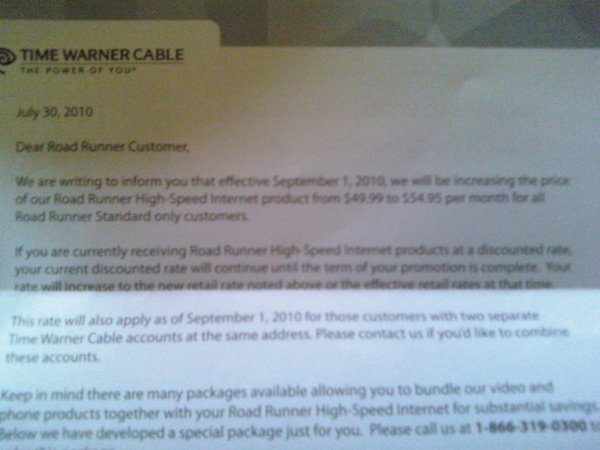
Greed is still good at Time Warner Cable
Time Warner Cable has tried every excuse in the book to justify their continued interest in Internet Overcharging schemes directed at residential Road Runner customers. Over a year after Stop the Cap! and its readers helped bury an experiment in overpriced broadband, the notion of doubling or tripling Internet pricing for consumers is still alive and well at the nation’s second largest cable company.
Nate Anderson of Ars Technica explored the thinking of Time Warner Cable’s executives a year later and discovered their desires for overcharging remain as strong as ever, but the excuses they give for wanting to do so have changed.
TWC’s revenues from Internet access have soared in the last few years, surging from $2.7 billion in 2006 to $4.5 billion in 2009. Customer numbers have grown, too, from 7.6 million in 2007 to 8.9 million in 2009.
But this growth doesn’t translate into higher bandwidth costs for the company; in fact, bandwidth costs have dropped. TWC spent $164 million on data contracts in 2007, but only $132 million in 2009.
What about investing in its infrastructure? That’s down too as a percentage of revenue. TWC does spend billions each year building and improving its network ($3.2 billion in 2009), but the raw number alone is meaningless; what matters is relative investment, and it has declined even as subscribers increased and revenues surged. “Total CapEx [capital expenses] as a percentage of revenues for the year [2009] was 18.1 percent versus 20.5 percent in 2008,” said the company a few months ago.
In fact, CapEx has declined for the industry as a whole. As the National Broadband Plan noted, the big ISPs invested $48 billion in their networks in 2008 and $40 billion in 2009. (About half of this money can be chalked up to broadband; the rest of the improvements were done to aid cable or phone service.)
To recap: subscribers up, revenues up, bandwidth costs down, infrastructure costs down. This might seem like a textbook case of “viability”; what were execs like Britt and Hobbs talking about last year when data caps were held up as a necessary safeguard against doom?
 Before moving to Time Warner’s Excuse-O-Matic, let’s pause for a moment and reflect on the fact this company has stalled more on Internet upgrades than virtually every other major cable operator. Even bankrupt Charter Communications has been aggressively pursuing investment in the win-win DOCSIS 3 technology that allows cable operators to sell faster tiers of service -and- reduce congestion in heavy web-surfing neighborhoods. By effectively “bonding” several cable channels devoted to its broadband service together, the pipeline into even the most hip college neighborhoods can sustain a full-scale assault by Hulu fans streaming high bandwidth video. Comcast realized this more than two years ago and rolled out its super-fast 50Mbps tier to a dozen cities well over a year ago. In contrast, Time Warner Cable managed to bring forth its “wideband” offering in just a handful of communities — New York City being the largest, last year.
Before moving to Time Warner’s Excuse-O-Matic, let’s pause for a moment and reflect on the fact this company has stalled more on Internet upgrades than virtually every other major cable operator. Even bankrupt Charter Communications has been aggressively pursuing investment in the win-win DOCSIS 3 technology that allows cable operators to sell faster tiers of service -and- reduce congestion in heavy web-surfing neighborhoods. By effectively “bonding” several cable channels devoted to its broadband service together, the pipeline into even the most hip college neighborhoods can sustain a full-scale assault by Hulu fans streaming high bandwidth video. Comcast realized this more than two years ago and rolled out its super-fast 50Mbps tier to a dozen cities well over a year ago. In contrast, Time Warner Cable managed to bring forth its “wideband” offering in just a handful of communities — New York City being the largest, last year.
Internet providers always try to awe an audience with claims about the billions of dollars they invest in improved technology, while forgetting to mention they earn tens of billions in profit on those investments. The shock and awe of stacks of money piled high on a table is tempered when you see the warehouse holding the rest of the cash standing behind it.
Broadband is becoming the single biggest revenue source for cable operators, passing digital phone and well on the way to passing cable television service. It’s the cash cow that can be milked forever, especially with the limited number of choices most Americans have to obtain the service.
 Back to Nate’s story:
Back to Nate’s story:
Several months ago, while on a business trip to Manhattan, I entered a nondescript building near the Flatiron building and rode the elevator to the top. Inside was one of TWC’s main New York operations centers, hosting an astonishing array of cable and Internet gear. But the real showpiece was the monitoring room, a darkened room with control hardware, computers, and a wall of TVs showing every cable channel currently running out over TWC’s network.
It looked brand new and obscenely expensive. Engineers slipped in and out in silence. A huge pile of boxes on the floor held a new set of replacement TVs. When I make my career shift from ink-stained wretch to Evil Genius, this is exactly the sort of room I will build in order to plot my world domination.
“It’s not a cheap endeavor to run a network like we do,” said TWC’s tweeting VP of Public Relations, Alex Dudley, when I had spoken to him the week before. Here was an obvious reminder of what he meant.
Time Warner Cable’s version of a command and control center, wall after wall fitted for television sets — the Time Warner Cable Sports Bar — impresses only until you realize the company could have paid for it out of the petty cash box. It’s obvious nobody was watching those televisions last spring as wide-scale protests erupted in four of the cities Time Warner Cable chose for their experimental pricing project. If they had, they would have apologized to their customers and buried the idea then and there.
At this point, Mr. Anderson began the useless attempt to debate Mr. Dudley, whose job is to sell the agenda of Time Warner Cable (and obfuscate when necessary). Why has Time Warner Cable’s senior management held onto its dreams of Internet Overcharging like a pit bill, refusing to let go, Anderson asked. Because of labor costs, Dudley replied.
As Internet use increases, TWC techs, engineers, and executives need to make adjustments such as DOCSIS upgrades at the cable company headend or “node splits” that divide a shared cable loop in two when bandwidth use hits certain metrics. Paying all of these people costs money, and those costs increase as the network is more heavily used.
Last April, when Time Warner Cable was relying on its tweeters like TWCAlex to spin a tale about how their Internet Overcharging schemes would benefit customers and help pay for DOCSIS 3 upgrades (which ended up bypassing cities like Rochester, N.Y., and went to New York City instead — where no such pricing scheme was tested), Alex’s bosses were just completing a layoff of some 1,250 Time Warner Cable employees. As Internet use was increasing, Time Warner Cable was decreasing the number of its employees from coast to coast.
If Alex is telling the truth, Time Warner Cable needs an employment fund from 8.9 million customers. Considering many Time Warner Cable cities raised the price on Road Runner service by $5 a month this year, that’s $240 million dollars a year to get the pot started and I’m only counting four million of those subscribers. If Time Warner Cable hired back those 1,250 former employees, they could each get $192,000 a year from that kitty. Implement Internet Overcharging schemes that could triple consumers’ rates for an equivalent level of service and they could earn as much as CEO Glenn Britt and then some.
I’m also uncertain how often Time Warner Cable executives are shimmying up phone poles or clearing out wasp nests inside those green cabinets positioned all over town while performing service upgrades and node splits. It’s far more likely they are spending their time dreaming up new excuses to raise cable rates.

Please deposit 25 cents for the next megabyte of usage
This latest excuse, while certainly novel, is just another bit of nonsense.
Time Warner Cable actually spent more money last year dealing with HD channel rollouts and upgrading their cable systems to support Switched Digital Video to accommodate them. The company did not exactly slap limits on how often cable viewers can leave their sets on, nor pitted their average TV viewers against viewing piggies who watched too much. Maybe the coin slot on top of the cable box can be tried in 2011.
In fact, as broadband equipment continues to become more reliable and scaled to manage growing demand, it’s becoming easier than ever to keep broadband lines humming at the cable company. That leaves Time Warner in the envious position of enjoying increasing profits on service that increases in price while decreasing in cost. In fact the only thing growing at a faster pace than the company’s broadband profits is the level of incredulity informed consumers have towards cable companies with long lists of excuses to justify rape and pillage pricing.
No matter what Time Warner Cable executives want you to believe, the FCC noted in its broadband plan that international bandwidth has grown 66 percent each of the last five years, all while the costs have dropped by 22 percent per year to handle that traffic.
Consumers do not want these Internet Overcharging schemes. Time Warner Cable should do itself a favor and drop them, once and for all, just as they have done for their Road Runner Mobile service. If 3G/4G wireless broadband from Time Warner comes without usage caps, why in the world should cable broadband be any different?
 Time Warner Cable is probably changing your channel lineup, or already has — removing several analog channels you used to receive as part of your Standard Service subscription and moving them to digital.
Time Warner Cable is probably changing your channel lineup, or already has — removing several analog channels you used to receive as part of your Standard Service subscription and moving them to digital.

 Subscribe
Subscribe








